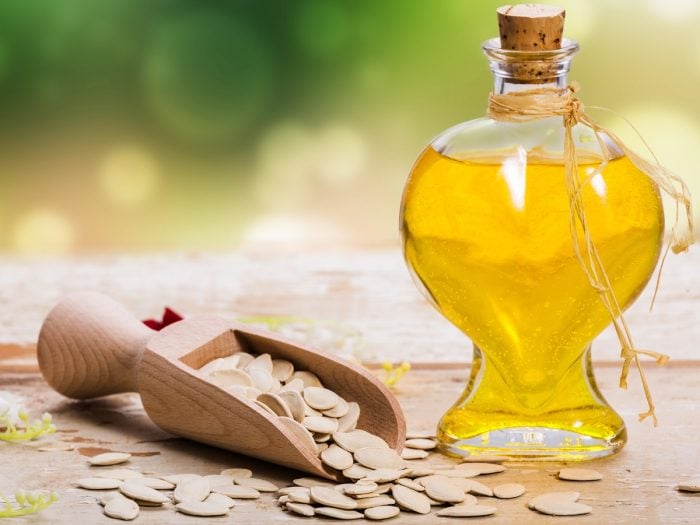Pumpkin seed oil is a remarkably powerful source of health benefits which may include its ability to improve heart health, aid in skincare, improve circulation, and strengthen the bones. It may also good for stimulating hair growth, eliminating inflammation, balancing hormones.
What is Pumpkin Seed Oil?
Pumpkin seed oil is derived from the unhusked seeds of pumpkin and has been traditionally made in parts of Europe for more than 300 years. Cucurbita pepo [1]is the scientific name of pumpkins, but there are dozens of cultivars and subspecies from which this oil is now made.
The oil is pressed from these seeds and is then used for a wide variety of culinary, and medicinal applications, and is now available in many parts of the world. The oil is either a dark green or a deep red, depending on the thickness of the oil, but when the oil begins to brown, it takes on a bitter taste.
In culinary applications, it is used as a salad dressing, in desserts, or even added to soups and stews for a nutty sweetness. However, due to its low smoke point, it is not used as cooking oil. Heating the oil would neutralize the polyunsaturated and monounsaturated fats that are found in significant quantities in this oil, including oleic, linoleic, palmitic, stearic, linolenic, and other fatty acids. These active ingredients provide the majority of health benefits associated with this oil.
Benefits of Pumpkin Seed Oil
Using pumpkin seed oil might benefit people dealing with poor blood circulation, anxiety, stress, hair loss, inflammatory conditions, hormonal imbalances, enlarged prostate, high blood pressure, high cholesterol, various skin conditions, and osteoporosis.
Hair Care
Losing your hair is a sure sign of aging, but for people who are balding at a young age, studies have shown that regular use of pumpkin oil may stimulate hair growth considerably.

Pumpkin seed oil helps you get smooth skin. Photo Credit: Shutterstock
May Improve Heart Health
The pumpkin seed oil has one of the highest concentrations of polyunsaturated fats of any food source. While fats are usually associated with being unhealthy, the body actually requires a certain amount of good fats to function. The oleic and linoleic acids found in pumpkin seeds may help lower blood pressure and balance cholesterol levels, protecting against atherosclerosis, heart attacks, strokes, and other heart diseases. [2]
Might Reduce Inflammation
The high content of healthy fatty acids in pumpkin seed oil may aid in joint lubrication and might reduce the pain and discomfort associated with arthritis. [3]
Skin Care
The fatty acids found in pumpkin seed oil boast antioxidant properties. When it is topically applied, it may reduce skin inflammation, stimulate the growth of new cells, defend against infections and oxidative stress in skin cells, and reduce the appearance of wrinkles and blemishes related to age. Pumpkin seed oil is also a rich source of vitamin E, which may have powerful effects on skin appearance and texture. [4]
May Increase Circulation
The anticoagulant nature of pumpkin seed oil may help to stimulate circulation by eliminating sluggish blood, lowering the risk of blood clots, and improving the oxygenation of organs, which further boosts their function. [5]
May Help Balance Hormones
Women who are menstruating or going through menopause are suggested to use pumpkin seed oil as it may to helps reduce associated symptoms. It may aid in reducing severe menstrual cramps and decreasing hot flashes. This is primarily due to the phytoestrogens and phytosterols present in it. [6]
May Increase Bone Strength
Omega-6 fatty acids, found in a significant amount in pumpkin seed oil, are known to possibly support bone health, in addition to the other vitamins and minerals that are needed to prevent osteoporosis and ensure good bone mineral density as we age. [7]
Side Effects of Pumpkin Seed Oil
The side effects of using pumpkin seed oil may include gastrointestinal distress, skin inflammation, and heart issues, but generally speaking, very few are reported.
If used in appropriate amounts or diluted, the pumpkin seed oil is safe and does not have any toxicities.
For internal consumption, no more than two teaspoons per day (800mg) are required for the therapeutic benefits of this oil; most people find that consuming 1 teaspoon per day is adequate.
- Skin Irritation: Pumpkin seed oil is a very potent and powerful substance that can may have notable effects on the body, which can sometimes manifest as irritation, redness, or swelling of the skin. For people with sensitive skin, it is best to put a small amount of this oil on the skin and wait for a few hours to see if any reaction occurs.
- Allergies: As with any concentrated oil from a plant or herb, an allergy to pumpkins means that you should stay away from this oil, as it can cause everything from topical dermatitis and swollen lips to more severe stomach issues and vomiting.
- Blood Pressure: The antioxidants and polyunsaturated fats found in pumpkin seed oil may help lower blood pressure, which is excellent for people concerned with their heart health. However, if you are already taking hypotensive medication, the combination can result in dangerously low blood pressure.
- Quality Issues: Pumpkin seed oil is quite susceptible to temperature and sunlight, which can hamper its quality. Normal shelf life is no more than 1 year, and when used past this point, it can result in stomach upset and gastrointestinal problems.
